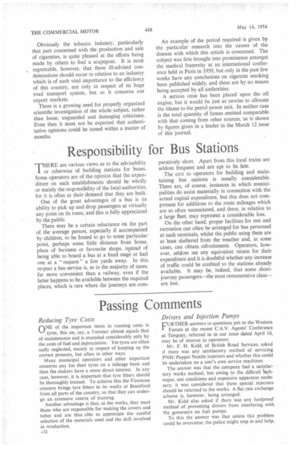Responsibility for Bus Stations
Page 34

If you've noticed an error in this article please click here to report it so we can fix it.
TlERE are various views as to the advisability air otherwise of building stations for buses. Some operators are of the opinion that the expenditure on such establishments should be wholly or mainly the responsibility of the local authorities, for it is often at their demand that they are built.
One of the great advantages of a bus is its ability to pick up and drop passengers at virtually any point on its route, and this is fully appreciated by the public.
There may be a certain reluctance on the part of the average person, especially if accompanied by children, to be forged to go to some particular' point, perhaps some little distance from home, place of business or favourite shops, iris/cad of being able to board a bus at a fixed stage or hail one at a " request " a few yards away. In this respect a bus service is, as in the majority of cases, far more convenient than a railway, even if the latter happens to be available between the required places, which is rare where the journeys are corn paratively short. Apart from this local trains are seldom frequent and are apt to be. late.
The cost to operators for building and maintaining bus stations is usually considerable. There are, of course, instances in which municipalities do assist materially in connection with the actual capital expenditure, but this does not compensate for additions to the route mileages which are so often necessitated, and these, in relation to a large fleet, may represent a considerable loss.
On the other hand, proper facilities for rest and recreation can often be arranged for bus personnel at such terminals, whilst the public using them are at least sheltered from the weather and, in some cases, can obtain refreshments. Operators, however, seldom see any equivalent return for their expenditure and it is doubtful whether any increase of traffic could be credited to the stations already available. It may be, indeed, that some shortjourney passengers—the most remunerative class— are lost.




































































































